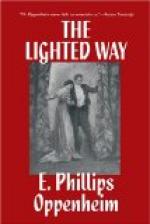“None at all, sir.”
Mr. Weatherley sighed. He seemed a little disappointed.
“Did you lunch at the Carlton?”
“We took our coffee there afterwards,” Arnold said. “We lunched at a small foreign restaurant near Oxford Street.”
“The Count Sabatini was there?”
“Yes, sir,” Arnold told him. “Also Mr. Starling.”
Mr. Weatherley nodded slowly.
“How do you get on with Count Sabatini?” he inquired. “Rather a gloomy person, eh?”
“I found him very pleasant, sir,” Arnold said. “He was good enough to ask me to dine with him to-night.”
Mr. Weatherley looked up, a little startled.
“Invited you to dine with him?” he repeated.
Arnold nodded.
“I thought it was very kind of him, sir.”
Mr. Weatherley sat quite still in his chair. He had obviously forgotten his secretary’s presence in the room, and Arnold, who had seated himself at his desk and was engaged in sorting out some papers, took the opportunity now and then to glance up and scrutinize with some attention his employer’s features. There were certainly traces there of the change at which Mr. Jarvis had hinted. Mr. Weatherley had the appearance of a man who had once been florid and prosperous and comfortable-looking, but who had been visited by illness or some sort of anxiety. His cheeks were still fat, but they hung down toward the jaw, and his eyes were marked with crowsfeet. His color was unhealthy. He certainly had no longer the look of a prosperous and contented man.
“Chetwode,” he said slowly, after a long pause, “I am not sure that I did you a kindness when I asked you to come to my house the other night.”
“I thought so, at any rate, sir,” Arnold replied. “It has been a great pleasure to me to make Mrs. Weatherley’s acquaintance.”
“I am glad that my wife has been kind to you,” Mr. Weatherley continued, “but I hope you will not misunderstand me, Chetwode, when I say that I am not sure that such kindness is for your good. Mrs. Weatherley’s antecedents are romantic, and she has many friends whose position in life is curiously different from my own, and whose ideas and methods of life are not such as I should like a son of my own to adopt. The Count Sabatini, for instance,” Mr. Weatherley went on, “is a nobleman who has had, I believe, a brilliant career, in some respects, but who a great many people would tell you is a man without principles or morals, as we understand them down here. He is just the sort of man to attract youth because he is brave, and I believe him to be incapable of a really despicable action. But notwithstanding this, and although he is my wife’s brother, if I were you I would not choose him for a companion.”
“I am very much obliged to you, sir,” Arnold answered, a little awkwardly. “I shall bear in mind all that you have said. You do not object, I presume, to my dining with him to-night?”




